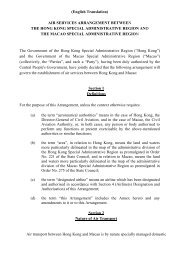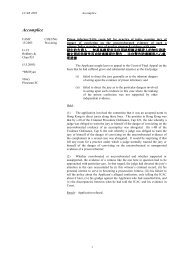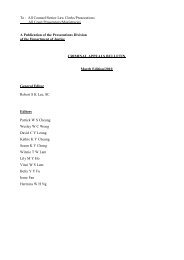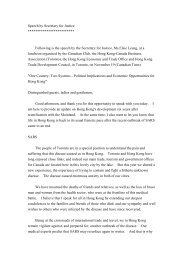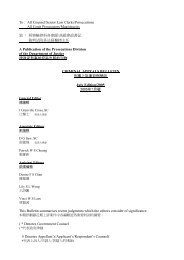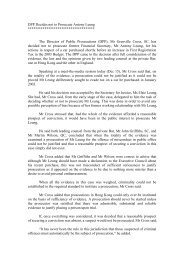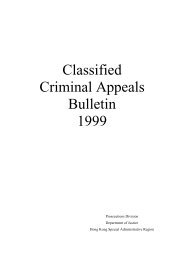刑事檢控科各律師/高級律 - Department of Justice
刑事檢控科各律師/高級律 - Department of Justice
刑事檢控科各律師/高級律 - Department of Justice
Create successful ePaper yourself
Turn your PDF publications into a flip-book with our unique Google optimized e-Paper software.
27<br />
(5) Ins<strong>of</strong>ar as A3 and A4 complained <strong>of</strong> disparity <strong>of</strong> sentence,<br />
two situations commonly arose where there was such a complaint.<br />
The first was when there was a disparity between sentences passed<br />
on the same occasion by the same judge. In this case the sentence<br />
should only be varied if it could be shown that the judge failed to<br />
apportion blame between the various defendants properly so that it<br />
could be said that, notwithstanding that the appellant’s sentence<br />
was otherwise appropriate, it was so disparate when compared<br />
with the other sentences passed at the same time on his codefendants<br />
as to engender a real sense <strong>of</strong> grievance on his part.<br />
The second was when different sentences were passed on different<br />
accused for the same <strong>of</strong>fence or <strong>of</strong>fences by different judges on<br />
different occasions. In that situation the only consideration was<br />
whether the sentence passed on the accused was proper: R v So<br />
Hung-lee and Another [1986] HKLR 1049 and R v Lam Ho-kwong<br />
Cr App 175/92;<br />
(6) In R v Stroud (1977) 65 Cr App R 150, Roskill LJ said that it<br />
had never been intended that a sentence should be reduced on<br />
account <strong>of</strong> disparity unless there was a glaring disparity which<br />
engendered a grievance. In R v Fawcett (1983) 5 Cr App R (S)<br />
158, Lawton LJ, at 161, put the basis for an appellate court’s<br />
intervention in a disparity argument as follows: ‘Would right<br />
thinking members <strong>of</strong> the public, with full knowledge <strong>of</strong> all the<br />
relevant facts and circumstances, learning <strong>of</strong> this sentence<br />
consider that something had gone wrong with the administration<br />
<strong>of</strong> justice?’ If the answer to that question was in the affirmative an<br />
appellate court would consider interfering, not necessarily because<br />
justice had not been done to a particular person, but because what<br />
had been done <strong>of</strong>fended against the appearance <strong>of</strong> justice: R v<br />
Potter [1977] Crim LR 112;<br />
(7) In this case there were four other defendants, each convicted<br />
<strong>of</strong> a greater number <strong>of</strong> <strong>of</strong>fences than A3 and A4, who each<br />
received the same overall sentence <strong>of</strong> 6 years’ imprisonment that<br />
they did. The judge failed to make a clear distinction in respect <strong>of</strong><br />
culpability regarding A3 and A4. This engendered a real and<br />
legitimate sense <strong>of</strong> grievance in their minds and the commonsense<br />
test <strong>of</strong> Lawton LJ in Fawcett (supra) was made out.<br />
Result - Applications <strong>of</strong> A1 and A2 dismissed. Applications <strong>of</strong><br />
A3 and A4 allowed, and sentences on each <strong>of</strong> 4 years<br />
and 6 months’ imprisonment substituted.<br />
[For disparity generally, see Sentencing in Hong Kong,<br />
4th ed, at pp 177 to 183: Ed]<br />
CAs 550 & (1) KWOK Robbery/Victim assaulted in private premises/Theft <strong>of</strong> PIN



